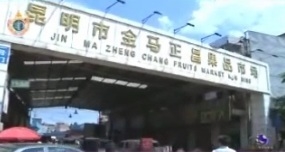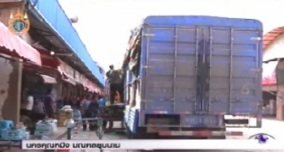Thai fruit exports appear to have a bright future in the Chinese market, as the Asian Highway 3 (R3A), linking China, Laos and Thailand, has bolstered Thailand’s trades to its neighbours to the north, particularly China.
Kunming in China’s Yunnan Province is a main export destination of Thai fruits.
Thai fruit is delivered by road every afternoon to the city’s largest fruit market, ‘Jin Ma Zheng Chang’.

The 1,100km R3A route, launched in April last year, has much facilitated trade there, starting from Thailand’s Chiang Khong in Chiang Rai province to China’s Kun Ming, passing through Laos’ Houayxai in Bokeo province and reaching China at Mohan in Yunnan.
Aiming to substantially raise economic prosperity in the region through increased trade and investments, the Asian Highway route R3A, under the Economic Quadrangle Project for Economic Cooperation among Upper Greater Mekong Sub-region, has so far achieved its goal, for Thai fruit exports using this road have grown considerably from Bt90 million in 2010 to Bt700 million last year.

A Chinese fruit seller speaking to Thai News Agency said that about 150 containers of Thai longans are imported annually with each container representing 25 tonnes by his small shop at the market. It takes only about one hour to finish selling one container of the popular fruit, he said, reflecting the high regard for Thai fruits among Chinese consumers.
The fruit seller said that Thai produce — particularly durian, longans, and mangosteens — are popular due to their good qualities, taste, and reasonable price compared to fruits imported from other countries.

To facilitate the process of gaining further exports, Thammarat Wanglee, adviser to the Thai minister of agriculture and cooperatives, said a cold storage distribution centre will be built at Thailand’s Chiang Khong border before sending Thai products on to Laos. A customs system will also be set up there, he added.
The bright future of Thai fruit exports continues since the Thai and Chinese private sectors have collaborated to set up a distribution centre for Thai agricultural produce in Kunming in the next five years. It will be one of the five centres planned for the Yunnan Region.

Meanwhile, in Bangkok, Thai Ambassador to Beijing Wiboon Khusakul said at the Meeting of Thai Ambassadors and Consuls-General in early August, that the government’s policies announced at the meeting requiring ambassadors to find more markets and expand the value of Thai trade can be applied immediately, particularly expanding agricultural exports.
The official visits of Thailand’s prime minister to China and several top Chinese officials to Bangkok resulted in more collaboration between the two nations, especially on tax reduction, he said.

“The meeting took note of China as a large market, and that Thailand could definitely penetrate it. Plans to develop higher quality fruit markets in China supported by higher purchasing power will add trade value,” Mr Wiboon said.
Thailand will also have an advantage once the communication network in the ASEAN region is complete, for it can transport fruit to China at lower cost, while attracting Chinese travellers to spend more money in Thailand is targeted in the tourism sector.





